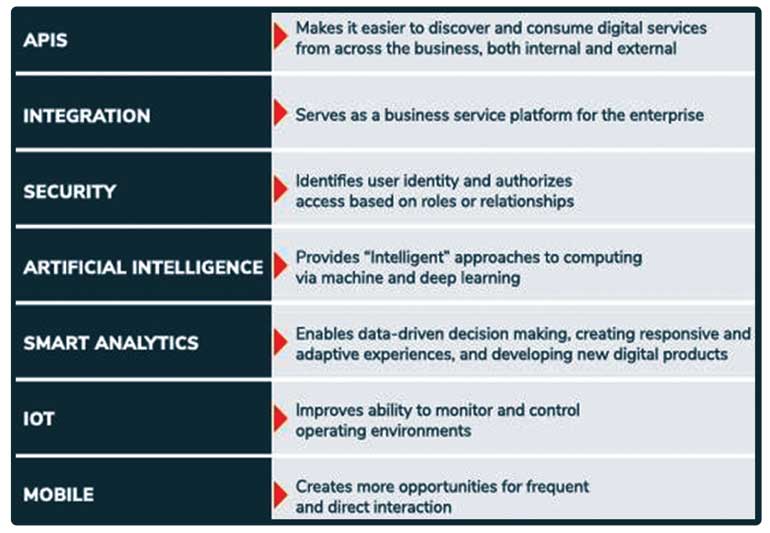Saturday Feb 14, 2026
Saturday Feb 14, 2026
Wednesday, 5 April 2017 00:01 - - {{hitsCtrl.values.hits}}
The level of transformation that technology allows is going beyond human imagination. It’s clear that software, in terms as a technology enabler, is engulfing every industry today and transforming them rapidly. Today, technology is so ingrained in our lives, that it’s transforming humans by redefining the way they think and carry out day-to-day tasks.

Research has indicated that by 2030, there will be little or no difference between virtual reality and normal reality. It’s already happening – artificial intelligence (AI) and technology are taking over the world with even people being digitally transformed, let alone businesses. Reality becomes what our brain processes as input signals from various devices. For instance, certain paraplegic or quadriplegic patients could make use of a robotic sensor that would provide electric signals to the brain to interpret human feelings upon touch.
Digital transformation can take you one step further and make you do things you’re not able to do otherwise simply through providing a layer of enablement to the business entities, which provide the various services. It’s not far-fetched and there are signs of such initiatives already in play. Uber is a great example of a business that’s completely digitally transformed – it’s taken out the traditional taxi industry, but has taken it one step further by automating some of the key functions of such a business. The next step would be self-driven cars that won’t require a driver because a computer could possibly drive infinitely better than a human due to its ability to project and negotiate coordination, speed, right of way, etc.
Like it or not, it’s global
Technology is evolving at a rapid pace today, putting pressure on enterprises to explore opportunities to keep up and to stay ahead of competition. This transition is not necessarily limited for “foreign” or “developed” countries only. Businesses in Sri Lanka too are susceptible to change because technology provides a new and easy way to add value and become more competitive. In other words, it enables organisations to be increasingly innovative and compete at a much higher level than ever before. This transformation is iterative as barriers for entry that existed yesterday can change today or even be irrelevant tomorrow.
Yet, the path to digital transformation needs to be paved cautiously given the many challenges that an organisation could potentially face in the process; they need to consider that fine balance between the cost benefit from a business perspective and ethical challenges from a human perspective. What’s important though is that local organisations need to take the first step given the rate and pace as well as the intensity and depth to which digital transformation is taking place today, globally.
Pressures forcing Sri Lankan firms to prep now
Local organisations are possibly not feeling the pinch yet as they may be misled that Sri Lanka is somewhat insulated due to low competitive pressures;  Sri Lanka’s relatively small market size generally puts a cap on very high investments or technology-led innovation.
Sri Lanka’s relatively small market size generally puts a cap on very high investments or technology-led innovation.
However, this is the time that organisations here need to start thinking about their digital transformation journey seriously and lay down a workable strategy. It’s only a matter of time for technology enabled global brands to quickly enter the market and provide stiff competition to local players, e.g. the grand entry of Uber to Sri Lanka versus PickMe that was already present, offering the same service at a lower price. This trend will extend to even traditionally regulated businesses, such as those in the financial industry.
On the flip side, by becoming a digital-based business an organisation’s market opportunity will no longer be limited to Sri Lanka, giving them potential to reach a much larger and wider market.
In order to move with the global trend of becoming a digital transformation business, organisations need to consider some key technology enablers that will support this process. Understanding what these are would help in creating that overall strategy to transform digitally.
Key enablers in action
It’s very rare that enterprises today run with zero systems. Usually business enterprises have multiple systems in place, which include both legacy as well as standard systems, and on-premise as well as cloud systems. Integration would interlink all these systems and build the master business service platform.
These business services will be consumed by both internal and external users. APIs would provide secure access to these business services, manage and analyse usage, and open up operations to a wider, relevant audience together with the ability to market any business services appropriately.
With the creation of a business service platform and the addition of an API layer, security becomes the next key enabler through which identity and access management could be done seamlessly.
With a business service platform in place and an API layer used by various users there would be a multitude of digital events going through the business enterprise; this opens up the need to analyse these events and draw intelligence in real time as well as from a predictive standpoint with the use of historical data and models.
We talked about technological advances and humans today been more or less configured to be driven based on the various devices and device capabilities. Similarly, in a business, digital events pertaining to the organisation and its operational side will not be limited to user portals or application inputs; events can also be generated through the various “things” placed in the enterprise premises or mobile devices used by the personnel, thus bringing in Internet of Things technology too as an enabler, which would play the part of bringing in more relevant digital events into this complete ecosystem.
In conclusion, customers are looking for a digital experience that’s more personalised and real time; they are also seeking an experience that’s predictive and geo-sensitive in terms of services and experience they get from an organisation. To be able to offer this experience, organisations need to transform now, rather than later through embracing digital transformation.
(The writer is Director – Solutions Architecture at WSO2. In her role, she works closely with customers from various business domains and provides solutions based consultancy as to how the WSO2 stack could be used effectively to achieve an organisation’s business objectives. Prior to this her focus was with the cloud technical group at WSO2 where she was a member of the WSO2 Private PaaS and App Factory teams. She has 15 years of experience in the IT industry with previous experience in building telecom billing systems and enterprise search systems. For questions/feedback on this article email [email protected].)